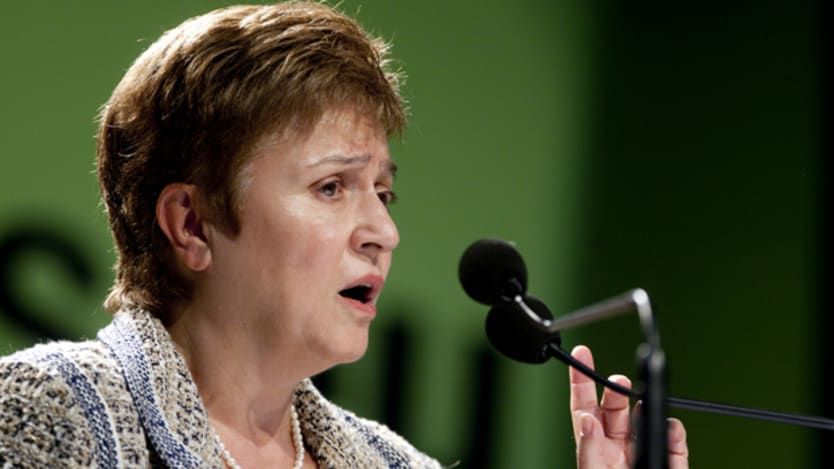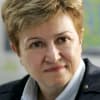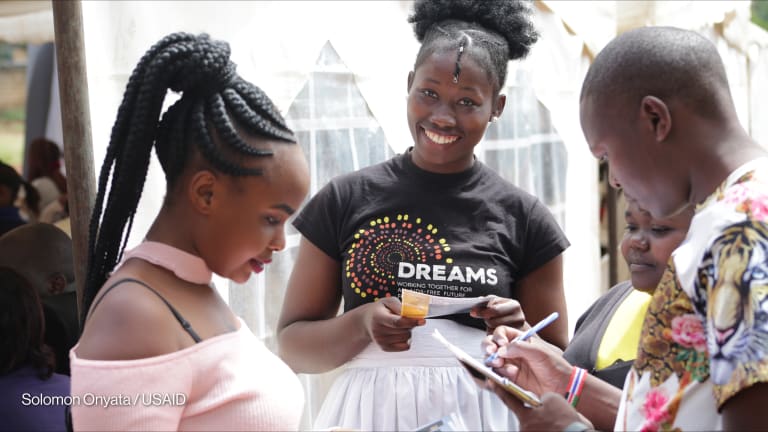
In many parts of the world, being born a girl is a life sentence — even in this day and age. It automatically reduces the chances of living a decent life and increases the risks of poverty, discrimination, violence and denial of education.
The evidence is heartbreaking.
Women and girls are 14 times more likely than men and boys to die in a disaster. In an emergency, girls are the first to drop out of school with their futures often sacrificed. The majority of the world's refugees are women and children — and conflicts and natural disasters only make this terrible situation even worse.
I have seen this for myself time and again in Asia, Africa and the Middle East.
In Lebanon and Jordan, I've met Syrian girls struggling to cope with the reality of their new refugee status while supporting their suffering families. One of them, 13-year-old Aisha whom I met in the Bekaa Valley, couldn't go to school because she had to work as a laborer to put bread on the table for her handicapped mother and younger sister.
Aisha and thousands of other Syrian refugee girls are faced with great risks: violence, rape, sexual assault, forced and early marriage, psychological and emotional abuse. Given that more than half of Syria's refugees in neighboring countries are women and girls, we can imagine how far-reaching the consequences of these risks are.
The suffering of Syrian girls is yet another reason to worry about the future of their country. I wonder if Aisha — and countless others like her — will find their way back to the classroom to have a chance of building a better future for themselves, their families and their country.
Disproportionately exposed
Emergencies also leave girls disproportionately exposed to child marriage and sexual violence — outcomes that destroy their chances of leading a healthy and productive life.
I will never forget the girls I met in Panzi hospital in eastern Congo, which is supported by the European Union and treats the victims of sexual violence. But these girls were not there to visit older relatives — they were victims themselves.
But the news is not all grim. In the face of the unspeakable horrors to which they have been subjected, women and girls of all ages are often capable of extraordinary resilience. The young Syrian refugees I spoke with demonstrated what it means to make the best out of a desperate situation. Indeed, the girls in the Panzi hospital showed me their fierce will to recover and move on. Their courage is a lesson in human dignity.
A key force for good
Girls are future mothers, role models and educators and therefore are a key force for good for their families, communities and countries. To succeed, they need humanitarian donors and relief workers to be their allies, to give them a helping hand so that they can help themselves.
The European Commission is doing just that. We have introduced a gender-age marker — a practical tool with several applications.
First, it checks to what extent a humanitarian project takes into account the specific needs of the most vulnerable beneficiaries. Second, it ensures that the projects we fund are designed in a way that will help women and girls according to their particular needs and the risks they face. And third, it looks at how to tap into the strengths and potential of women and girls and give them the chance to participate in reconstruction or reconciliation efforts in the aftermath of the crises they have survived.
By requesting our partner organizations use the gender-age marker, we guarantee that our aid reaches its objectives — and that it contributes to long-term recovery and women’s empowerment.
A conscious choice
The gender-age marker is just one practical example of a conscious choice the EU has made in its activities as an aid donor — the choice to boost the effectiveness and efficiency of our assistance by empowering women in crisis areas. This contributes to the success of our relief assistance projects, but the positive effects are also there for the much longer term.
Empowered women who are fully engaged in the recovery of their communities stay empowered, engaged and respected, they serve as role models for their daughters, they break stereotypes and they help build a future of more equal participation and of shared responsibility.
For example, take the case of Merlinda, a single mother of two who narrowly escaped Typhoon Haiyan when it struck the Philippines in November 2013. It wiped away everything she possessed and she lost all means to make a living, send her two daughters to school or even to provide a roof over their heads.
The future was looking very bleak indeed until Merlinda enrolled in an EU-funded reconstruction project. Now, together with other women from her neighborhood, Merlinda works on clearing the debris and on making sure that new buildings are disaster-proofed to withstand future storms.
The project gives these local women a powerful sense of self-worth — they are reconstructing their community on a sounder footing and building a better future for their children. Today, Merlinda is proud to be back on her feet as a breadwinner for her family. She is eager to put her children through school, respected by her peers and admired by her daughters.
Resilience: A matter of life or death
Merlinda’s story is a reminder of women's resourcefulness and perseverance — even in desperate circumstances.
Together with women's willpower, wisdom and creativity, this resilience is a great resource that we cannot leave untapped — especially given the enormous challenges we face in terms of more frequent and intensive disasters, growing extremism and conflicts with an ever-higher impact on civilians.
This is why resilience is such an important priority for the EU as a donor — a priority that bridges our humanitarian work and our longer-term development assistance. We work together with development partners on this, because resilience is too important to ignore and requires a commitment from the whole aid sector.
In some parts of the world — for instance the disaster-prone Sahel and the Horn of Africa — the resilience of the vulnerable populations is a matter of life or death. And women are a special target for our work on resilience — whether we’re working with breast-feeding mothers in Niger to recognize the physical signs of malnutrition before it's too late to save their children, or we give cash vouchers to women in Chad so that they can feed their families.
We need women as our allies if we are to be successful in boosting the future resilience of their countries.
Education: Harnessing potential
If it's true that women hold up half the sky, then it's even truer that girls hold up half the future. And the best investment we can make — for peace, security and a better future for everyone — is the investment in education.
Inspired by the Nobel Peace Prize awarded to the EU in 2012, European leaders decided to dedicate this award to the continuous promotion of peace through support for children growing up in conflict settings. This gave rise to the EU Children of Peace initiative, which today reaches out to nearly 30,000 children in conflict areas of Africa, Asia and South America. It gives them access to education and safe spaces so that they can play, learn and grow up.
Among the beneficiaries are 2,000 Pakistani girls living in the Jalozai camp for internally displaced people near Peshawar. Most of these girls had no access to education before. Some had to brave shells and mortars to go to school — if they were allowed to go at all. Working with UNICEF, we've opened 15 primary schools in the camp and we’re distributing school supplies.
“One child, one teacher, one book, one pen can change the world,” Malala Yousafzai once said.
With our support for girls' education in her native Pakistan, we are making sure this change takes place. No society can develop without harnessing the potential of all of its members.
Through integrating a gender marker in our humanitarian aid, through our investment in resilience and through our commitment to education of the most vulnerable children, the European Union is helping women build a future that is fairer, kinder and more equitable.
I could hardly think of a more important priority for all of us in the humanitarian and development community.
Want to learn more? Check out She Builds and tweet us using #SheBuilds.
She Builds is a month-long conversation hosted by Devex in partnership with Chemonics, Creative Associates, JBS International as well as the Millennium Challenge Corp., United Nations Office for Project Services and U.K. Department for International Development.








